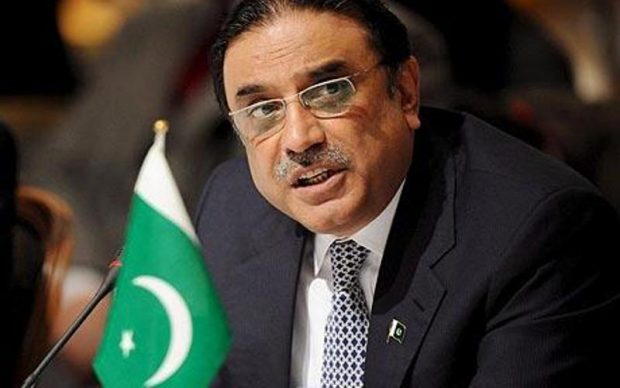Asif Ali Zardari elected as Pakistan’s 14th President

Asif Ali Zardari
By Nasir Aijaz
The AsiaN Representative
ISLAMABAD: Pakistani lawmakers on Saturday elected Asif Ali Zardari, the co-chairman of center-left Pakistan People’s Party (PPP), as the country’s 14th president. He is the only politician of Pakistan who has been elected second time as the Head of State.
Asif Ali Zardari previously served as the president in 2008-2013 during the government of his own party. He is also the first ever democratically elected president to complete his tenure in the South Asian Muslim-majority country’s 75-year history.
The new President was elected by the electoral college of the newly elected members of the Senate, the Upper House, National Assembly, the lower house of parliament, and the four provincial assemblies, as per the provisions of the Constitution.
Zardari, 68, the joint candidate of the Pakistan People’s Party and the Pakistan Muslim League-Nawaz, defeated his rival Mahmood Khan Achakzai, 75, the candidate of the Sunni Ittehad Council (SIC), a religio-political group.
Zardari, is the widower of the two-time Prime Minister Benazir Bhutto. His rival Mahmood Khan Achakzai is a veteran nationalist politician from the southwestern Balochistan province, leader of Pakhtunkhaw Milli Awami Party, but had backing of Sunni Ittehad Council, a religiopolitical group comprising of jailed ex-Prime Minister Imran Khan’s Pakistan Tehreek-e-Insaf (PTI) party.
Some small political parties, including Jamiat Ulema-e-Islam Fazal (JUI-F) and Jamaat-e-Islami, boycotted the election and no member of parliament from these parties cast their votes. The two parties together had 20 senators and MNAs in parliament, who abstained from voting in the presidential election. The JUI-F has 11 MNAs and four senators. The JI’s lone senator and PML-Functional senator also did not cast their votes. Moreover, the PTI’s three senators also did not show up to vote.
Zardari has been elected as the President of Pakistan with a wide margin, defeating the rival candidate Mahmood Khan Achakzai.
As per the final vote tally, Zardari won 255 votes, while Achakzai polled 119 votes.
The new President of the Islamic Republic of Pakistan is scheduled to be sworn in on Sunday March 10. The oath-taking ceremony will be held on Sunday at 4pm at the President’s House. Chief Justice of Pakistan Justice Qazi Faez Isa will administer the oath to the newly elected president.
Zardari was born in July 1955 to a Sindhi landlord family and received his early education at Saint Patrick’s School in Karachi, Pakistan’s commercial hub and the capital of southern Sindh province.
He graduated from a Cadet College, near Hyderabad, the second largest city of Sindh, and later studied business in London.
Although his father, Hakim Ali Zardari, was an active politician, he initially showed no interest in politics. Before becoming an avid polo player, Asif Zardari appeared as a child star in a local film.
His betrothal to Benazir Bhutto, who had returned from self-exile in London in 1986, surprised many people in the country.
The two got married in 1987, which marked his entry into politics. The couple shared three children, Bilawal Bhutto Zardari, daughters Bakhtawar and Assefa.
Bilawal is currently the PPP chairman and remained the country’s Foreign Minister under Premier Shehbaz Sharif’s previous government from April 2022 to August 2023.
Asif Zardari came into the limelight after Benazir Bhutto was elected as Pakistan’s first- woman Prime Minister in 1988, but his opponents quickly accused him of corruption and kickbacks.
His first government position was as environment minister during Benazir’s second term, which lasted from 1993 to 1996. He was also the minister of investment from 1995 to 1996.
His opponents dubbed him “Mr. 10%” and blamed him for the dismissal of Benazir’s two governments due to allegations of corruption.
Later, he served several jail terms from 1990 to 2004 in cases for crimes ranging from corruption to murder, money laundering, and kidnapping for ransom. None of the charges, however, has ever been proven in the courts.
Zardari has been elected as a member of the lower house, or the National Assembly, four times and once as a senator from 1990 to 2024. He resigned from parliament after being elected as president on Saturday.
In Benazir’s last years, Zardari remained out of politics and mostly stayed in the US, amid rumors of a strained relationship with his spouse. He also sought treatment for psychological distress caused by his years-long imprisonment, which had taken a toll on his physical and mental health.
He only returned to the country a few days after Benazir was assassinated at a rally in Rawalpindi, a garrison city in northeast Pakistan, in Dec. 2007.
Amid countrywide violent protests against Benazir’s assassination, Zardari immediately took reigns of the party, appointed Bilawal as chairman and himself co-chairman on the “pretext” of his spouse’s “will.”
His smart handling of a heavily charged atmosphere, mainly in Sindh following Benazir’s assassination, not only earned him a reputation as a sagacious politician but also brought him close to the “establishment,” a term to describe the country’s powerful army that has played an oversized role in making and breaking of governments.
Months after his party won the 2008 general elections, he was elected president, making him the de facto ruler of a country that practices parliamentary democracy, with the prime minister serving as the chief executive.
He was once again arrested by the PTI government in a graft case in 2019 but released on bail after six months.
PPP, founded by Zulfiqar Ali Bhutto, the first elected Prime Minister of Pakistan, ruled Sindh province for over 15 consecutive years from 2008. Currently, the PPP has formed the government in Sindh and Balochistan province.





















































